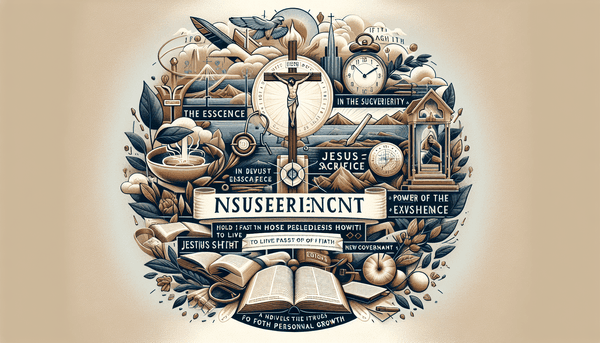The Meaning of Christian Fellowship in the Bible
Christian fellowship, as described in the Bible, transcends mere social interaction; it is a spiritual union among believers based on their shared faith in Jesus Christ. This sacred kinship is vividly portrayed in Acts 2:42-47, where the early Christians lived in unity, devoting themselves to the apostles' teachings, fellowship, breaking of bread, and prayers. These practices were more than rituals; they embodied a commitment to mutual support, sharing, and communal living. Each member, as part of the 'body of Christ' (1 Corinthians 12:12-27), played a critical role in this divine organism, sustaining one another in love and service. Furthermore, Christian fellowship was not only about sharing material possessions but also about fostering spiritual growth, mending conflicts peaceably, and forgiving one another, as exemplified in scriptures like Galatians 6:2 and Hebrews 10:24-25. In fellowship, believers strengthen each other and collectively contribute to the expansion of God's kingdom, embodying the unity of purpose and spirit found in 1 John 1:7.
The Interplay Between Faith and Works According to the Bible
The relationship between faith and works is a cornerstone of Christian doctrine, harmonizing belief with action. Faith, characterized by a deep trust in God, naturally leads to works — the tangible expressions of that faith. James 2:17 starkly reminds us that faith without deeds is lifeless, urging believers to manifest their faith through love and service. While Ephesians 2:8-9 clarifies that salvation is a gift of grace received through faith and not a result of works, it does not negate the importance of works as evidence of a transformed life. Galatians 5:6 further emphasizes that in Christ, faith is made complete through acts of love. These works serve as a testament to our faith, visible to those around us, inspiring them to glorify God as instructed in Matthew 5:16. Thus, faith and works are not adversaries but allies, each affirming the validity of the other in the Christian walk.
Bible Passages for Comfort and Encouragement
In times of distress, the Bible stands as a beacon of hope, offering verses that speak directly to our hearts. These scriptures provide comfort and encouragement, reminding us of God's unwavering love and presence. Verses such as Isaiah 41:10 encourage us not to fear, for God is steadfastly by our side. This comfort extends to our innermost anxieties, as Philippians 4:6-7 invites us to present our worries to God through prayer, assuring us of the peace that transcends all understanding. The Psalms, often considered a spiritual balm, include passages like Psalm 46:1, which proclaims God as our refuge and strength. During life's tumultuous storms, Romans 8:38-39 affirms that nothing can sever us from God's love, while 2 Corinthians 4:8-9 offers solace, ensuring us that though we may face hardships, we are never forsaken. These scriptures are more than words; they are a source of divine strength and comfort to be woven into the fabric of our daily prayers and reflections.
Conclusion
As we conclude this journey through the pillars of Christian life, we are reminded that the teachings of the Bible are as relevant today as they were in the times of the early church. The principles of fellowship, faith in solitude, the synergy of faith and works, and the comforting power of scripture provide a framework for our spiritual growth and daily living. These themes are not merely topics for contemplation but are calls to action, inviting us to deepen our connection with God and with one another. As we embrace the journey of understanding God's plans and our faith, let us carry forward the insights gleaned from this exploration, integrating them into our lives as we seek to embody the love, strength, and wisdom bestowed upon us through God's word.
FAQ
Q: What is the importance of Christian fellowship?
A: Christian fellowship is essential because it reflects the relationship and unity among believers based on their common faith in Jesus Christ. It involves mutual support, sharing, and living out the teachings of the Bible together, which strengthens individual believers and the church as a whole.
Q: How can I maintain my faith when I feel alone?
A: You can maintain your faith during times of loneliness by engaging in prayer, reading scripture, and seeking the support of a church community. Remembering God's promises of his constant presence can also provide comfort and reassurance.
Q: What does the Bible say about the connection between faith and works?
A: The Bible teaches that genuine faith naturally leads to works as an expression of that faith. While salvation is a gift that comes through faith and not by works, the deeds a person does can serve as evidence of their faith and glorify God.
Q: Can the Bible provide comfort in difficult times?
A: Yes, the Bible offers many passages that provide comfort and encouragement. Scriptures remind us of God's presence, love, and the hope we have in Him, which can be especially meaningful during challenging times.






